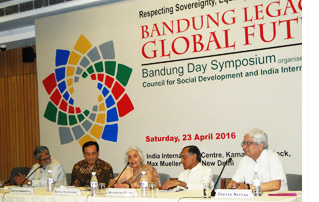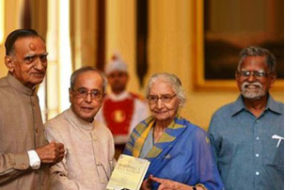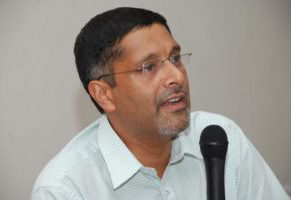Organized by
Council for Social Development, New Delhi
August 29 – September 2, 2016
Democracy is inextricably linked to the welfare and freedom of its citizens including minorities. The Constitution of India guarantees religious freedom and also provides incentives such as right to establish minority educational institutions with state’s support and right to follow specific customary practices. However, socio-economic deprivation, exclusion and discrimination faced by minorities are some of the crude realities of our country. In the past few years, the predicament is further complicated by frequent incidents of violence, ranging from small-scale violence to mass violence and pogroms. In this context, Council for Social Development organised a five day workshop to discuss rights of minority in contemporary India. The Council recognises this initiative significant as it will have a bearing on the democratic ethos of the sovereign, socialist, secular republic of India.
Participants were mainly research scholars, academics and activists who almost unanimously considered this workshop very significant and timely. Research scholars and students were mainly from Jawaharlal Nehru University, Delhi University, Jamia Milia Islamia University and Amity University. Some faculties from Jamia Milia Islamia University, Ambedkar University and Delhi University also participated in the workshop. The formal sessions of the workshop started from 3 pm onwards and this provision facilitated many professionals to participate in the workshop. Three of the five days in the workshop, however, began at 11 am. Additional sessions of these three days included screening of film “Invoking Justice”, play “Hum Khawateen” and visit to street children’s home “Ummeed Ghar”.
The main themes discussed in the workshop were:
(1) Safeguarding minority rights as an essential principle of democracy.
(2) Laws and judicial decisions (pertaining to minority rights).
(3) International institutions and conventions on minority rights.
(4) Major institutions of state and government programme and policies for protection of minorities.
(5) Economy and minorities.
(6) Minority rights in conflict situations.
(7) Civil society organizations working among minorities.
(8) Minority women’s rights and gender justice.
(9) Minority educational institutions.
(10) Minority rights and democracy: challenges and possibilities.
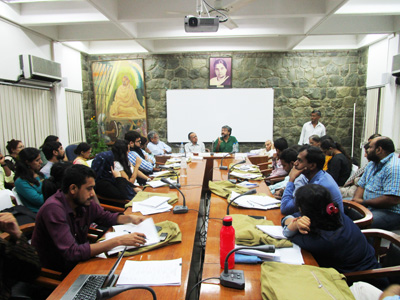 Justice Rajendra Sachar inaugurated the workshop. He underlined the importance of vulnerable condition of minorities by highlighting the major issues confronted by minorities in India. He also discussed in detail the findings of his report that highlights the living and working condition of minorities. In the first session, Professor Rajeev Bhargava discussed in length the theoretical and practical approach to address issues of minority. He not only addressed the constitutional provisions that safeguards minority interests but also the practical implications of these provisions. Professor Bhargava underscored the importance of understanding the problems faced by minority communities in India and highlighted the need to address these issues in order to preserve the democratic ethos of the country. He also discussed the changing contours of political discourse in India and its implications on the status of minority rights. Professor Bhargava argued that safeguarding minority rights must be considered as one of the most essential principles of democracy. He maintained that democratic ethos of any country cannot be preserved without addressing and safeguarding minority rights.
Justice Rajendra Sachar inaugurated the workshop. He underlined the importance of vulnerable condition of minorities by highlighting the major issues confronted by minorities in India. He also discussed in detail the findings of his report that highlights the living and working condition of minorities. In the first session, Professor Rajeev Bhargava discussed in length the theoretical and practical approach to address issues of minority. He not only addressed the constitutional provisions that safeguards minority interests but also the practical implications of these provisions. Professor Bhargava underscored the importance of understanding the problems faced by minority communities in India and highlighted the need to address these issues in order to preserve the democratic ethos of the country. He also discussed the changing contours of political discourse in India and its implications on the status of minority rights. Professor Bhargava argued that safeguarding minority rights must be considered as one of the most essential principles of democracy. He maintained that democratic ethos of any country cannot be preserved without addressing and safeguarding minority rights.
Second day began with screening of Deepa Dhanraj’s film Invoking Justice. The film portrays a unique initiative by a group of Muslim women in Tamil Nadu who began their Jamat. This women’s Jamat addresses and intervenes into matters of family dispute and this initiative is unique as it is the first Jamat of women. Family dispute matters are usually dealt with by Jamat of all male members. The film shows how members of women’s Jamat in Tamil Nadu negotiate with the patriarchal institutions, ranging from families and Jamat to police and judiciary, to facilitate women in getting justice.
Formal sessions of the day were addressed by Professor B S Chimni and Professor K B Saxena. Professor Chimni discussed about legal-institutional approach towards minorities in India and underscored the importance of international conventions held on the issues of minority rights. He also emphasized over the significance of contextualizing minority rights within the democratic framework. Professor K. B. Saxena eloquently discussed about various policies and development programs for minorities in India. While highlighting the issue of minorities, he presented a critical review of the practical problems faced by minority in India. He shared how dominant perception about a particular community can debar them from not only exercising their rights but also result in filibustering of essential development policies for them. Professor Saxena referred to Sachar and Mishra Committee reports and emphasised the need to address the problems that are already reflected in these crucial reports. He argued that expecting development of the nation without addressing the problems of minority community would be an unrealistic vision. In the next session, Dr Adnan Farooqui discussed about major institutions and government programmes for minorities. He argued that public initiatives taken for safeguarding minority rights and interest cannot be effective in the absence of substantial funding and autonomy.
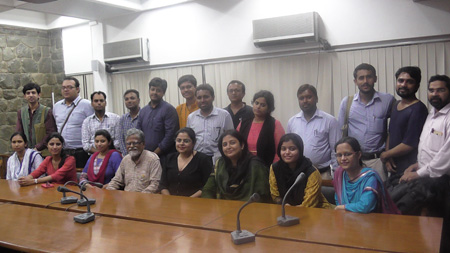 Like the second day, third day of the workshop also began at 11 am with an Urdu play “Hum Khwateen” by Rascahkra, a group of theatre activists. The play is based on published writings of Muslim women in early twentieth century. The play shows Muslim women’s critical response to the dominant socio-political discourse of that era. Formal session of the day started with Professor Amitabh Kundu’s presentation of the Kundu Committee Report, the latest report on status of minority in India. The report is based on findings of a committee headed by Professor Kundu himself. His findings offer crucial data on the economic, health and nutritional status of various social categories in India. One of the major findings of the report discussed the nutritional level of women among various social categories. Referring to the report that indicates comparatively lower disparity between nutritional level among Muslim men and women, Professor Kundu argued that this fact also implies comparatively better status of women in Muslim households. He added that while poverty among Muslims is much higher in urban areas, economic state of Muslim community is slightly better in rural areas because of their dependence on non-farm activity. Overall status of Muslims in India is comparable to other marginalized communities like SCs and STs. Professor Kundu’s talk on the economic status of minority community threw some new light into the existing picture. Next session was addressed by Ms. Rita Manchanda. She discussed the relevance and importance of minority rights in conflict situations. She argued that relevance of minority rights is tested in the conflict situation and insisted that India has become comparatively more prone to conflict situation than ever. Referring to the practical implication of conflict situation, she argued that conflicts usually arise because of communal propaganda. According to her, best possible approach for safeguarding minority rights could be strengthening law enforcement mechanism.
Like the second day, third day of the workshop also began at 11 am with an Urdu play “Hum Khwateen” by Rascahkra, a group of theatre activists. The play is based on published writings of Muslim women in early twentieth century. The play shows Muslim women’s critical response to the dominant socio-political discourse of that era. Formal session of the day started with Professor Amitabh Kundu’s presentation of the Kundu Committee Report, the latest report on status of minority in India. The report is based on findings of a committee headed by Professor Kundu himself. His findings offer crucial data on the economic, health and nutritional status of various social categories in India. One of the major findings of the report discussed the nutritional level of women among various social categories. Referring to the report that indicates comparatively lower disparity between nutritional level among Muslim men and women, Professor Kundu argued that this fact also implies comparatively better status of women in Muslim households. He added that while poverty among Muslims is much higher in urban areas, economic state of Muslim community is slightly better in rural areas because of their dependence on non-farm activity. Overall status of Muslims in India is comparable to other marginalized communities like SCs and STs. Professor Kundu’s talk on the economic status of minority community threw some new light into the existing picture. Next session was addressed by Ms. Rita Manchanda. She discussed the relevance and importance of minority rights in conflict situations. She argued that relevance of minority rights is tested in the conflict situation and insisted that India has become comparatively more prone to conflict situation than ever. Referring to the practical implication of conflict situation, she argued that conflicts usually arise because of communal propaganda. According to her, best possible approach for safeguarding minority rights could be strengthening law enforcement mechanism.
Fourth day began with visit to street children’s home “Ummeed Ghar”. The home is in Mehrauli, near Qutab Minar. Over hundred children live in the home. Most of the children of the home were admitted in the school and some were tutored at the home as they required additional preparation for joining regular schools. Older children received vocational/skill training at the home and are also facilitated in exploring livelihood options. Wall paintings by the home’s children were highly appreciated by the participants who spend about two hours with the children. A striking finding of this visit was that over 60 percent of the home’s children were Muslims. One of the concerned officials of the home shared that they do not follow any reservation policy in the home. Yet, majority of children at home are Muslims, a fact that possibly indicates the religious composition of street children in Delhi.
Mr Irfan Engineer and Ms Farah Naqvi were the speakers for the fourth day’s formal sessions. Mr Engineer primarily focused on the status of minority rights in India and role of civil society organizations working on the issue. He discussed how state’s response to civil society organizations influences these organizations’ dynamics and autonomy. Mr Engineer expressed his concern over the changing political milieu and status of minority in this context. Farah Naqvi, the second speaker of the day, also shared this concern. Her lecture was focused on minority women’s rights and gender justice. She shared her experience of working with minorities, especially in Muzaffarnagar and Dadari. Ms Naqvi reminded how there is a constant effort to establish victimized image of Muslim women to portray Muslim as inhuman barbaric community. Whereas, as Kundu Committee Report shows, comparatively better literacy rate and nutritional status of Muslim women indicates that gender disparity among Muslim households is not as wide as it has been among most of the privileged communities in the country. Ms Naqvi discussed about the multiple layers of exploitation that exist within the contours of patriarchal framework and how religion plays a crucial role in promoting these exploitative structures.
Last day of the workshop started with Professor Faizan Mustafa’s lecture on minority educational institutions in India. He spoke about the historical context that generated need for minority educational institutions, especially university, and underscored how these institutions’ autonomy has been shaped by the dominant political discourses. The concluding session’s panel included Ms Farida Khan and the two conveners of the workshop- Professor Zoya Hasan and Professor Manoranjan Mohanty. Ms Khan shared her experience of addressing incidences of minority rights’ violation, especially in case of Muslim women. Professor Hasan referred to the changing discourse of Indian society and polity and underscored how emerging challenges are distinctive as they are not only jeopardizing but directly attacking the secular foundation of the country. This concern was shared by other two speakers, Professor Mohanty and Ms Khan, as well. Marginalization is a process that leads to sidelining of a certain community/individual to the periphery of the social space that eventually constrain their choices at political space and scope of negotiation at socio-economic fronts. It is a complex contested dynamic that is inextricably linked with the concept of inequality within the marginalized communities. Professor Mohanty insisted that it is extremely important that the political and social consciousness is revived to save this country from democratic breakdown. The contemporary assault upon the secular character is devastating and people from different sections will have to respond to the challenges. Professor Mohanty noted that safeguarding minority rights is an element or the very definition of democracy and we must work for preserving communal harmony for building a democratic society.
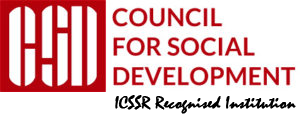
 Justice Rajendra Sachar inaugurated the workshop. He underlined the importance of vulnerable condition of minorities by highlighting the major issues confronted by minorities in India. He also discussed in detail the findings of his report that highlights the living and working condition of minorities. In the first session, Professor Rajeev Bhargava discussed in length the theoretical and practical approach to address issues of minority. He not only addressed the constitutional provisions that safeguards minority interests but also the practical implications of these provisions. Professor Bhargava underscored the importance of understanding the problems faced by minority communities in India and highlighted the need to address these issues in order to preserve the democratic ethos of the country. He also discussed the changing contours of political discourse in India and its implications on the status of minority rights. Professor Bhargava argued that safeguarding minority rights must be considered as one of the most essential principles of democracy. He maintained that democratic ethos of any country cannot be preserved without addressing and safeguarding minority rights.
Justice Rajendra Sachar inaugurated the workshop. He underlined the importance of vulnerable condition of minorities by highlighting the major issues confronted by minorities in India. He also discussed in detail the findings of his report that highlights the living and working condition of minorities. In the first session, Professor Rajeev Bhargava discussed in length the theoretical and practical approach to address issues of minority. He not only addressed the constitutional provisions that safeguards minority interests but also the practical implications of these provisions. Professor Bhargava underscored the importance of understanding the problems faced by minority communities in India and highlighted the need to address these issues in order to preserve the democratic ethos of the country. He also discussed the changing contours of political discourse in India and its implications on the status of minority rights. Professor Bhargava argued that safeguarding minority rights must be considered as one of the most essential principles of democracy. He maintained that democratic ethos of any country cannot be preserved without addressing and safeguarding minority rights. Like the second day, third day of the workshop also began at 11 am with an Urdu play “Hum Khwateen” by Rascahkra, a group of theatre activists. The play is based on published writings of Muslim women in early twentieth century. The play shows Muslim women’s critical response to the dominant socio-political discourse of that era. Formal session of the day started with Professor Amitabh Kundu’s presentation of the Kundu Committee Report, the latest report on status of minority in India. The report is based on findings of a committee headed by Professor Kundu himself. His findings offer crucial data on the economic, health and nutritional status of various social categories in India. One of the major findings of the report discussed the nutritional level of women among various social categories. Referring to the report that indicates comparatively lower disparity between nutritional level among Muslim men and women, Professor Kundu argued that this fact also implies comparatively better status of women in Muslim households. He added that while poverty among Muslims is much higher in urban areas, economic state of Muslim community is slightly better in rural areas because of their dependence on non-farm activity. Overall status of Muslims in India is comparable to other marginalized communities like SCs and STs. Professor Kundu’s talk on the economic status of minority community threw some new light into the existing picture. Next session was addressed by Ms. Rita Manchanda. She discussed the relevance and importance of minority rights in conflict situations. She argued that relevance of minority rights is tested in the conflict situation and insisted that India has become comparatively more prone to conflict situation than ever. Referring to the practical implication of conflict situation, she argued that conflicts usually arise because of communal propaganda. According to her, best possible approach for safeguarding minority rights could be strengthening law enforcement mechanism.
Like the second day, third day of the workshop also began at 11 am with an Urdu play “Hum Khwateen” by Rascahkra, a group of theatre activists. The play is based on published writings of Muslim women in early twentieth century. The play shows Muslim women’s critical response to the dominant socio-political discourse of that era. Formal session of the day started with Professor Amitabh Kundu’s presentation of the Kundu Committee Report, the latest report on status of minority in India. The report is based on findings of a committee headed by Professor Kundu himself. His findings offer crucial data on the economic, health and nutritional status of various social categories in India. One of the major findings of the report discussed the nutritional level of women among various social categories. Referring to the report that indicates comparatively lower disparity between nutritional level among Muslim men and women, Professor Kundu argued that this fact also implies comparatively better status of women in Muslim households. He added that while poverty among Muslims is much higher in urban areas, economic state of Muslim community is slightly better in rural areas because of their dependence on non-farm activity. Overall status of Muslims in India is comparable to other marginalized communities like SCs and STs. Professor Kundu’s talk on the economic status of minority community threw some new light into the existing picture. Next session was addressed by Ms. Rita Manchanda. She discussed the relevance and importance of minority rights in conflict situations. She argued that relevance of minority rights is tested in the conflict situation and insisted that India has become comparatively more prone to conflict situation than ever. Referring to the practical implication of conflict situation, she argued that conflicts usually arise because of communal propaganda. According to her, best possible approach for safeguarding minority rights could be strengthening law enforcement mechanism.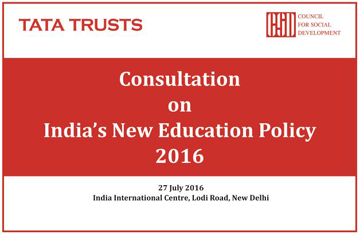
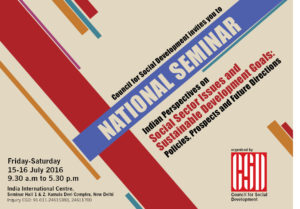
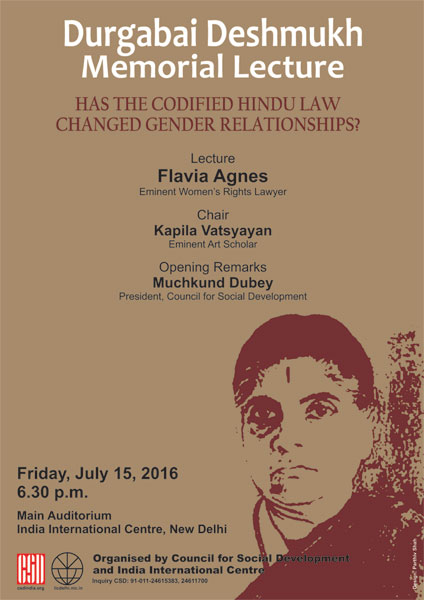 Flavia Agnes, a women’s rights lawyer. and a pioneer of the women’s movement in India spoke on, ‘Has the codified Hindu Law changed gender relationships’
Flavia Agnes, a women’s rights lawyer. and a pioneer of the women’s movement in India spoke on, ‘Has the codified Hindu Law changed gender relationships’